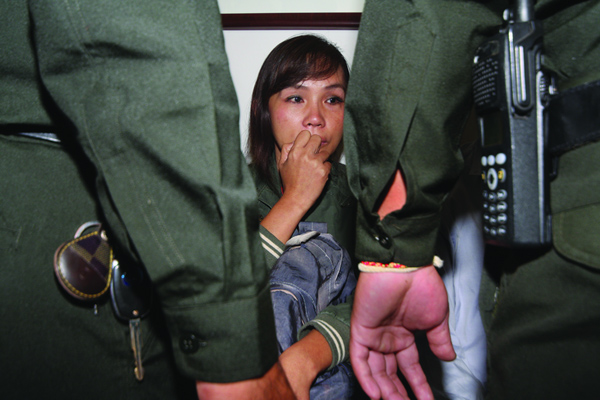CAMBODIA has deported two anti-government Red Shirt activists to Thailand, where they are accused of involvement in an attempted bomb attack in Bangkok last month. Kobchai Boonplod and Varisareeya Boonsom, both 42, were handed over to Thai officials at Phnom Penh International Airport yesterday, a move Long Visalo, secretary of state at the Ministry of Foreign Affairs, said symbolised Cambodia’s commitment to fighting “terrorist” acts.
“In the spirit of combating terrorism everywhere, we arrested the two people because they committed terrorist acts in your country and are handing them over to you now,” he told Suwat Kaewsook, charge d’affairs at the Thai embassy in Phnom Penh. “Our principle is to oppose terrorism, even if there is no request from your embassy.” Suwat said Thailand welcomed the government’s deportation of the two suspects. “On behalf of the Royal Thai Embassy, we would like to express appreciation on your cooperation about this matter,” he said.

- Red Shirt activist Varisareeya Boonsom, 42, tearfully awaits her deportation to Thailand at Phnom Penh International Airport on July 5. (Photo: Heng Chivoan)
The suspects were arrested on Saturday in Siem Reap province in connection with the attempted bombing of the Bangkok headquarters of the Bhumjaithai party, part of the Thai government coalition, on June 22. The attack, which apparently failed after a makeshift bomb detonated prematurely, followed two months of Red Shirt protests in Bangkok that sparked outbreaks of violence and left 90 people dead and about 1,900 injured. Long Visalo said the two had confessed to Cambodian police that they were involved in the bombing. “They accepted that they made the bombs in Thailand,” he said.
As he was escorted by police to the plane, however, Kobchai denied allegations that the pair was involved in the plot, and pledged to fight the charges. “We are Red Shirts, and if we are sent back to Thailand the government will kill us,” he told the Post. “We will get a lawyer and fight the government. We didn’t do anything, but the government has killed a lot of people.” A tearful Varisareeya said that sending her back to Thailand meant she was “going to die”.
Cambodia’s cooperation with Thailand could mark a thawing of relations between the two countries, which each withdrew their ambassadors after Phnom Penh appointed fugitive former Thai premier Thaksin Shinawatra as an economic adviser in October and then refused to extradite him. Following yesterday’s deportation, Prime Minister Abhisit Vejjajiva announced that he was grateful to Cambodia for returning the two suspects. He also pledged to “seek further cooperation” with Phnom Penh. On Sunday, Chheang Vannarith, executive director of the Cambodian Institute for Cooperation and Peace, predicted “positive developments in the bilateral relationship” as a result of the extradition.
But Cambodian Foreign Ministry spokesman Koy Kuong said the handover stemmed purely from the Kingdom’s counterterrorism policy. “We don’t take into consideration the improvement of diplomatic ties between Cambodia and Thailand,” he said. “If Thailand wants to improve Cambodian-Thai relations, it is up to the Thai side to make the decision. Cambodia will follow.”
Michael Montesano, a visiting fellow at Singapore’s Institute for Southeast Asian Studies, said Phnom Penh’s decision to give up the suspects was a textbook example of Prime Minister Hun Sen’s “shrewd” handling of Vejjajiva’s government. “Should the Thais be interested in better relations with Cambodia, Hun Sen will have opened the door,” he said. “Should Bangkok again take an anti-Phnom Penh line, Cambodia will be able to say that it had made an important gesture of friendship to Thailand, only to find itself spurned.”
Thai government spokesman Panitan Wattanayagorn was unavailable for comment yesterday. ADDITIONAL REPORTING BY CHEANG SOKHA AND AFP
[Published in the Phnom Penh Post, July 6, 2010]



